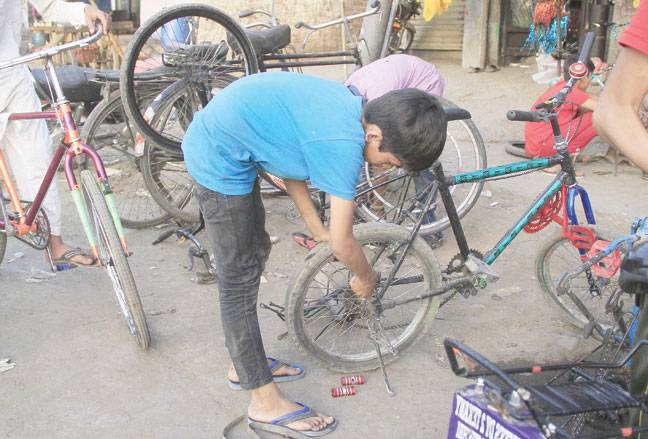LAHORE - A large number of children of school going age is seen everyday working at shops, petrol pumps and other places to earn livelihood for their families. Countless others of the same age sell various products on their wheel barrows to run their homes.
However, the Punjab government says in the Punjab Child Labour Survey conducted in 2017 that there are only 11,446 children and adolescents involved in child labour at workshops, petrol pumps and hotels. The survey was conducted with the financial assistance of Unicef.
Pakistan has signed several national and international conventions and protocols on child labour. Convention on the Rights of the Child, 1990 was ratified in 1990; Minimum Age Convention, 1973 (138) was ratified in 2006; Worst Forms of Child Labour Convention, 1999 (182) was ratified in 2001 and Optional Protocol to the Convention on the Rights of the Child on the Involvement of Children in Armed Conflict, 2002 was ratified in 2016. Despite the fact that Pakistan has ratified multiple international protocols, child labour can be seen everywhere in Punjab towns.
According to the International Labour Organisation, 218 million children between 5 and 17 years of age are in employment globally and among them 152 million are victims of child labour. Almost half of them, 73 million, work in hazardous conditions.
Taufeeq Umar, 16-year-old and resident of Jhang, has been working at a motorcycle workshop on Maulana Zafar Ali Khan Chowk aka Lakshmi Chowk. He says he is sponsoring his family through this job. “I have a brother, a sister and a mother to support. Who wants to do this job? I should have been in a school, but now it does not matter at all. When you need money, all other things become irrelevant,” Taufeeq said.
According to The Punjab Restriction on Employment of Children Act 2016, there are 38 types of works where a child cannot be recruited to work. These works include transport of passengers, goods or mail; catering establishment at a railway station; involving the movement of a vendor or any other employee of the establishment from one platform to another or into or out of a moving train.
According to the act, children cannot be exposed to toxic, explosive and carcinogenic chemicals, cement dust in cement industry, coal dust, manufacturing and sale of fireworks and explosives, sites where liquid petroleum gas (LPG) or compressed natural gas (CNG) is filled in cylinders, glass and metal furnaces and glass bangles manufacturing.
The Punjab Child Labour Survey was sponsored by the Labour and Human Resource Department and the Bureau of Statistics Punjab for 18 months at the estimated cost of Rs140.187 million. First time in Pakistan, Statistical Information and Monitoring Programme on Child Labour (SIMPOC) methodology is being used for conducting this survey.
An international consultant from Mannheim University of Germany has been selected with the support of Unicef.
On the recommendations of the Pakistan Bureau of Statistics, a pilot study in districts of Chakwal and Muzaffargarh was conducted and the activity of household listing is in progress.
On the other hand, a large number of children feel ‘secure’ to work at the cloth weaving and printing or dyeing sections.
Abdul Rehman, 13-year-old labourer from Okara who works at a cloth dyeing shop, says his salary is low, but he earns something to send to his family.
Child labour is multifaceted and it has affected Punjab’s social fabric. Runaway children or those who lost contact with their homes are regularly rescued by the Child Protection and Welfare Bureau in Punjab. The Child Protection Welfare Bureau said those children who lost their contact with their families have been kept at Child Protection Units where they are being provided all kinds of facilities so that they can start a new life.
Twelve-year-old Umme Rubab says she belongs to a poor family and she started working as a housemaid at a rich family’s house in her village. “They brought me to Lahore. They have two kids and I have to work from morning till late night. My woman employer once beat me up with pipes on the complaint of her daughter. One of the neighbors informed the Child Protection and Welfare Bureau and they rescued me. I do not want to do labour in a house instead I want to make my future bright,” she said.






